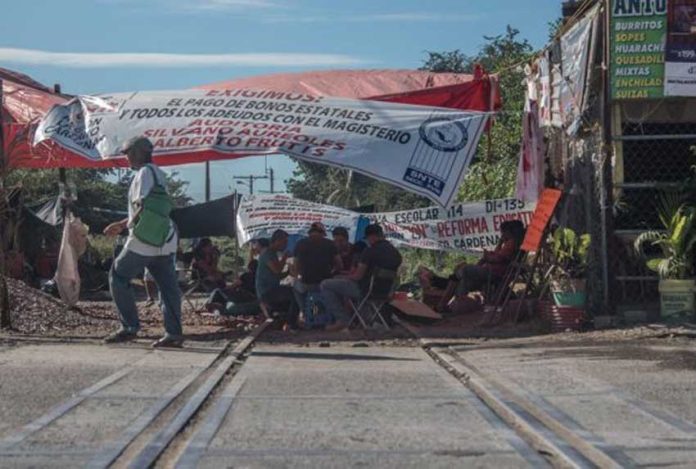Two rail blockades remain in place in Michoacán even though the state and federal governments have released more than 2 billion pesos in funding to pay salaries and bonuses in response to teachers’ demands.
Teachers who belong to the National Front of Struggle for Socialism (FNLS) and the National Democratic Executive Committee (CEND) are blocking tracks in Pátzcuaro and Uruapan after lifting their blockade in the former municipality for less than 24 hours earlier this week.
The CNTE union removed blockades in five other Michoacán locations last week after the state government paid teachers more than 1.2 billion pesos (US $62.9 million) in salaries for the second half of January.
The blockades, first erected on January 14 to protest against unpaid salaries and benefits, have cost the economy billions of pesos.
In December, the federal government transferred 1 billion pesos (US $52.4 million) to its state counterpart to cover teachers’ salaries for that month as well as the first part of their annual bonus and last month, it sent another billion pesos for January wages and the second bonus installment.
Yesterday, Michoacán Education Secretary Alberto Frutis Solís said that a further 95 million pesos has been made available to cover a payment known as Compensación Única Nacional (Single National Compensation) and that 80 million pesos will go to paying stipends to teaching students.
All told, the funds add up to 2.17 billion pesos (US $113.9 million).
Nevertheless, two groups of just under 40 radical teachers each refuse to fall into line with the CNTE union, whose Section 18 leaders reached a preliminary agreement with federal and state authorities that included a commitment to lift the blockades.
In Pátzcuaro, the teachers removed their blockade on Monday night but on Tuesday they returned to the railway tracks while in Caltzontzin, a community in Uruapan, they haven’t moved at all.
Section 18 members accuse the FNLA and CEND teachers of holding up further negotiations with state and federal authorities. Most schools in Michoacán remain closed.
In the 24 days since the blockades began, around 10,000 shipping containers have been stranded and more than 300 trains have been halted.
The Nuevo León industry association Caintra warned that the ongoing blockades are placing jobs at risk in several states including Michoacán, Colima, Guanajuato, México state, Mexico City, Sonora, Sinaloa and Baja California.
The association’s president, Juan Ignacio Garza Herrera, told a press conference that Mexico has lost 30% of its port capacity due to the inability of trains to move cargo from Lázaro Cárdenas and Manzanillo. Three million tonnes of freight have been stranded, he said.
Garza claimed that around 50,000 double semi-trailers are needed to transport such a quantity of cargo.
With the blockades estimated to be costing the economy more than 1 billion pesos a day, accumulated losses are now in the range of 25 to 30 billion pesos (US $1.3 to $1.6 billion).
Source: El Universal (sp), El Financiero (sp)
